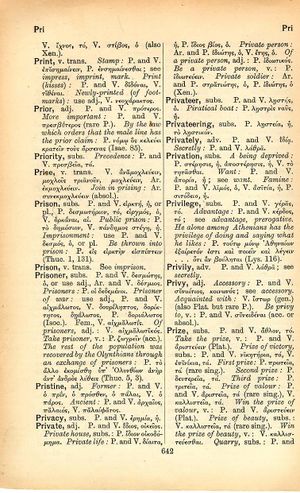privy: Difference between revisions
From LSJ
ὦ διάνοια, ἐὰν ἐρευνᾷς τοὺς ἱεροφαντηθέντας λόγους μὲν θεοῦ, νόμους δὲ ἀνθρώπων θεοφιλῶν, οὐδὲν ταπεινὸν οὐδ᾽ ἀνάξιον τοῦ μεγέθους αὐτῶν ἀναγκασθήσῃ παραδέχεσθαι → if, O my understanding, thou searchest on this wise into the oracles which are both words of God and laws given by men whom God loves, thou shalt not be compelled to admit anything base or unworthy of their dignity
(CSV4) |
m (Woodhouse1 replacement) |
||
| Line 1: | Line 1: | ||
{{Woodhouse1 | {{Woodhouse1 | ||
|Text=[[File:woodhouse_642.jpg|thumb|link={{filepath:woodhouse_642.jpg}}]] | |Text=[[File:woodhouse_642.jpg|thumb|link={{filepath:woodhouse_642.jpg}}]] | ||
===adjective=== | |||
[[accessory]]: [[prose|P.]] and [[verse|V.]] [[συναίτιος]], [[κοινωνός]]; see | |||
[[acquainted with]]: [[verse|V.]] [[ἴστωρ]] (gen.) (also [[Plato]] but rare [[prose|P.]]). | |||
[[be privy to]], v.: [[prose|P.]] and [[verse|V.]] [[συνειδέναι]] (acc. or absol.). | |||
}} | }} | ||
Revision as of 08:57, 20 May 2020
English > Greek (Woodhouse)
adjective
accessory: P. and V. συναίτιος, κοινωνός; see
acquainted with: V. ἴστωρ (gen.) (also Plato but rare P.).
be privy to, v.: P. and V. συνειδέναι (acc. or absol.).

